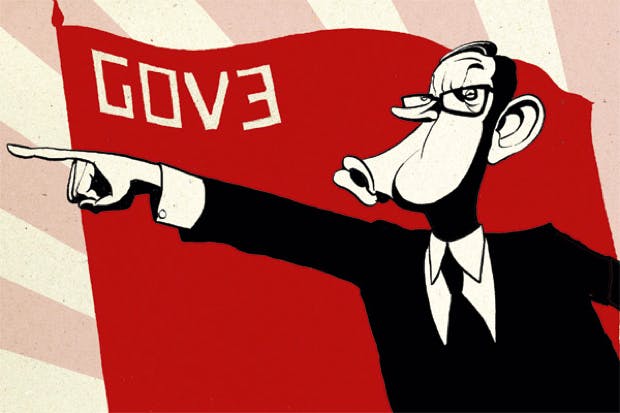What is levelling up? One of the problems with this nebulous term is that anyone in government who has understood what it means has decided to keep this a glorious secret, rather than sharing it with others. Now that there is an entire department for Levelling Up, it’s a bit harder to take this approach. Michael Gove is the new Secretary of State for the policy and spoke last night at a ConservativeHome fringe event at the Conservative party conference. He was keen not just to offer a picture of what levelling up will look like, but also to respond to critics within his own party who think this is somehow a left-wing agenda.
The fringe was launching a pamphlet by a group of recently-elected Tory MPs called ‘Trusting the People: The case for community-powered conservatism’, and Gove was particularly taken by some lines in it explaining the difference between conservatives, liberals and socialists. He said:
‘The crystallisation of those two points is absolutely critical in helping us to resolve some of the problems that we face at the moment. There is a tendency sometimes… to see any political conversation as a balance between state and individual. So, if it is the case that a government would forward a temporary limited and proportionate increase in one particular tax, then you will have, You will have commentators and others saying ooh, “the balance is tilted away from the individual to the state” – we’re obviously conservative, we don’t believe in an overmighty state but nor do we believe in individuals who are shorn of relations with communities of which they are a part, nor do we believe that individuals should be left to face the harsh winds of chance and adverse circumstances on their own.
Gove was pitching for levelling up to be as important a Conservative project as Brexit, and for the project to be managed within communities, rather than by government
Gove then went on to list some of the ways in which the state could help reinforce communities and institutions. He argued that ‘in many of our towns, the pride that people would want to take in their high street and the diversity of life has ‘diminished’ and that ‘if high streets are dominated by voice, chain stores and charity shops, then something very special is lost’. He talked about local football clubs, and most interestingly, the imposition of unattractive new build homes onto communities. ‘I don’t think it’s unfair to say that some of those who have been responsible for providing homes in the past haven’t build them in a way which is sufficiently sensitive to not just environmental concerns… but also both the question of beauty and also the question of community,’ he said.
Gove is a minister who often comes into a department and turns what his predecessor has been doing on its head. In his speech last night – and presumably again when he speaks to the main conference hall this afternoon – he was pitching for levelling up to be as important a Conservative project as Brexit, and for the project to be managed within communities, rather than by government. Government, from his perspective, is something that merely empowers those communities and allows them to take the decisions, rather than it being what decides what is good for everyone. He drew on his own experience with the free schools programme, too, saying that government helped the groups who wanted to set up schools by helping them find buildings, the money and introducing them to others doing the same thing.
He is also a minister who likes to surprise people with his reading list. Last night he cited American professor Robert Putnam who has looked at the decline of community groups, Paul Collier, and most strikingly, Marc Stears, who was a speechwriter for Ed Miliband.
He boiled all the things he’d listed down to ‘a phrase which I’ve been accused of using too often in the past, a desire on the part of the people to take back control’.
This was a bold thing to mention given the chaos in supply chains that’s causing the government so much angst at the moment. But the fringe itself gave many examples of the way Tory MPs themselves are working with their communities to take back control. Curiously it didn’t touch on infrastructure and big projects at all. Guy Opperman, the pensions minister and MP for Hexham, told the fringe about his experience of setting up two banks to serve his local community. MPs are always active in their communities, whether it’s trying to solve problems brought to them in constituency surgeries or helping local community groups. But this fringe seemed to suggest a new kind of community activism: one that doesn’t just represent people in parliament but also builds new institutions back at home. It sounds very compelling. It also sounds like a lot of work for legislators who don’t exactly have an enormous amount of time on their hands. Gove has a lot more fleshing out to do on how MPs and his party in government can really practically ensure that levelling up happens on the ground.







Comments